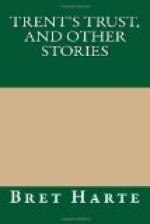They had taken their usual stroll through the Alameda, and had made the round of the shops, where the colonel had exhibited his usual liberality of purchase and his exalted parental protection, and so had passed on to their usual refreshment at the confectioner’s, the usual ices and cakes for Pansy, but this time—a concession also to the tyrant Pansy—a glass of lemon soda and a biscuit for the colonel. He was coughing over his unaccustomed beverage, and Pansy, her equanimity and volubility restored by sweets, was chirruping at his side; the large saloon was filling up with customers—mainly ladies and children, embarrassing to him as the only man present, when suddenly Pansy’s attention was diverted by another arrival. It was a good-looking young woman, overdressed, striking, and self-conscious, who, with an air of one who was in the habit of challenging attention, affectedly seated herself with a male companion at an empty table, and began to pull off an overtight glove.
“My!” said Pansy in admiring wonder, “ain’t she fine?”
Colonel Starbottle looked up abstractedly, but at the first glance his face flushed redly, deepened to a purple, and then became gray and stern. He had recognized in the garish fair one Miss Flora Montague, the “Western Star of Terpsichore and Song,” with whom he had supped a few days before at Sacramento. The lady was “on tour” with her “Combination troupe.”
The colonel leaned over and fixed his murky eyes on Pansy. “The room is filling up; the place is stifling; I must—er—request you to—er—hurry.”
There was a change in the colonel’s manner, which the quick-witted child heeded. But she had not associated it with the entrance of the strangers, and as she obediently gulped down her ice, she went on innocently,—
“That fine lady’s smilin’ and lookin’ over here. Seems to know you; so does the man with her.”
“I—er—must request you,” said the colonel, with husky precision, “Not to look that way, but finish your—er—repast.”




